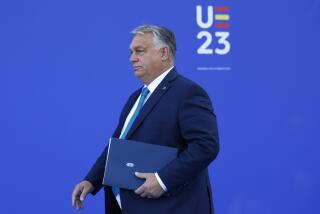COLUMN RIGHT/ ROGER SCRUTON : A Focus of Loyalty Higher Than the State : The monarchy created peace in Central Europe, and its loss precipitated 70 years of conflict.
- Share via
Why have liberals tolerated communists, while execrating fascists and Nazis, whose behavior is so similar? Why did Hannah Arendt, in “Origins of Totalitarianism,” lay the whole blame on 19th-Century nationalists, and why did she not notice Lenin, still less his mentor Karl Marx? Why did so many liberals tells us that the communism of the Soviet Union is not “real communism” when the very suggestion that there might be a real fascism, or real Nazism, free from the moral taint of the historian variety, would be dismissed as a despicable whitewash?
The answer is that liberals and communists share their most cherished belief: the belief in human equality. Mankind, they suppose, is one and indivisible, with a collective identity that transcends the primitive divisions of race, tribe and clan. The supreme evil is the attempt by one group to claim dominion over another: and no crime is more offensive than “racism,” which divides humanity in its very essence. From such premises, communists and liberals have advanced to a common conclusion: that national divisions are suspect and that national sentiments have no place in politics.
Recent events in Eastern Europe have added an ironic twist to this idea. Far from regarding communists as their common enemy and striving to be rid of them forever, the nations of Eastern Europe are blaming each other for the catastrophes of four decades. The Croatians blame the Serbs, the Slovaks blame the Czechs, while the Romanians--well, if the newspaper Romana Mare is to be believed, Romania’s desperate plight is caused by “Hungarian terrorism,” “Jewish revanchism” and the “Gypsy disease.” Visiting Romania last month, I was left in no doubt that the seeds of interethnic violence have been effectively sown. The question is, by whom and for what purpose?
I was not surprised to learn that those who call most loudly for vigorous action against Jewish conspirators, Hungarian terrorists and Gypsy dogs were until 1989 prominent members of the Communist Party, enthusiastic advocates of “proletarian internationalism” and champions of “friendship between peoples.”
Even more instructive is the case of Slovakia. Czechoslovkia’s President Vaclav Havel, being suspicious of nationalist sentiment, refused to appoint the heroic ex-dissident Jan Carnogursky as prime minister of Slovakia, for fear that Carnogursky might lead a national revival. Instead, Havel nominated Vladimir Meciar, a little-known figure who had pushed his way to prominence during the revolution by loudly declaring his allegiance to federal and democratic principles.
Within months, Meciar was using every device of demagoguery to set the Slovaks against the Czechs and to persuade the Slovaks that a version of national socialism is the true answer to their drastic problems. Nobody who knows Eastern Europe would be surprised to learn, however, that Meciar was until the 1989 revolution a member and secret activist of the Communist Party, trained in Moscow by the KGB. Fortunately, the Slovak National Assembly saw the danger in time, deposed Meciar and appointed Carnogursky in his stead.
We must see these strange events in their historical context. All the natural forms of social life--institutions, churches, clubs and companies--were oppressed or abolished by the communists. Politics and law were replaced by mock substitutes and culture was driven underground. It is hardly surprising, therefore, that people cling to their national sentiments, because these were the only form of belonging that the communists could not extinguish.
The answer is not to make war on national sentiment, nor to scorn it with high-handed liberal disdain. The answer is to find a focus of loyalty that is higher than the nation. We must look for an institution that occupies a place in the heart of the ordinary citizen, while remaining above and beyond the turmoil of politics, a court of appeal to which every faction, every ethnic group and every religious confession may address itself. Such, indeed, was the Imperial Crown. It was this that created peace in Central Europe, and it is the loss of it that precipitated 70 years of conflict on the Continent.
Alas, however, monarchs are also regarded with ridicule by liberals. Peace and stability can come again to Eastern Europe only when the superstitions of liberals have ceased to be effective in politics. I suspect therefore that mankind must pass through many more years of suffering before reaching the happy day when an emperor of Hungary is crowned again in Bratislava.
More to Read
Sign up for Essential California
The most important California stories and recommendations in your inbox every morning.
You may occasionally receive promotional content from the Los Angeles Times.










